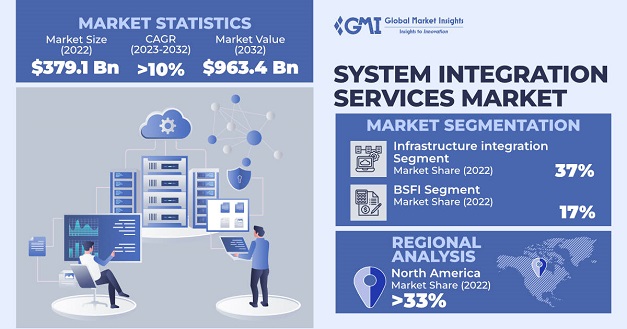Get a free sample of System Integration Services Market
Thank you!
Your inquiry has been received. Our team will reach out to you with the required details via email. To ensure that you don't miss their response, kindly remember to check your spam folder as well!
Form submitted successfully!
Error submitting form. Please try again.
Get a free sample of System Integration Services Market
Thank you!
Your inquiry has been received. Our team will reach out to you with the required details via email. To ensure that you don't miss their response, kindly remember to check your spam folder as well!
Form submitted successfully!
Error submitting form. Please try again.
System Integration Services Market Size
System Integration Services Market size was valued at USD 379.1 billion in 2022 and is estimated to register a CAGR of over 10% between 2023 and 2032. The rising adoption of cloud services is a significant factor propelling the market trends.

As businesses migrate to the cloud, they will require expert assistance to seamlessly integrate cloud solutions into their existing IT infrastructure. System integrators play a pivotal role in ensuring data interoperability, security, and the efficient management of cloud resources. The demand for integration services is intensifying as organizations harness the benefits of cloud computing, such as scalability, cost-efficiency, and remote accessibility, in making system integration services indispensable for modernizing and optimizing IT environments.
For instance, in July 2023, Google announced the general availability of the standalone integration Platform as a Service (iPaaS) solution. It is designed to simplify the process of connecting applications without the need for coding expertise. This iPaaS platform enables businesses to visually integrate and orchestrate their applications & data workflows seamlessly. By providing a user-friendly interface for integration tasks, Google Cloud aims to empower organizations and enhance their operational efficiency, data flow & application connectivity, making it easier for them to navigate the complexities of modern IT environments.
The increasing complexity of IT environments, marked by the proliferation of diverse technologies & platforms, is a key factor driving the system integration services market growth. One of the challenges faced by organizations is to make various systems & applications work harmoniously. System integrators offer expertise in designing, implementing, and managing integrated solutions, which helps in reducing operational inefficiencies & enhancing productivity. As IT landscapes become more intricate, the demand for system integration services will grow, ensuring that businesses can effectively leverage their IT investments and adapt to the evolving technology trends while maintaining seamless operations.
Security & privacy concerns pose significant challenges in the system integration services market. As organizations integrate multiple systems and data sources, there is an increased risk of data breaches and cyberattacks. To address this issue, system integrators must prioritize robust cyber security measures including encryption, access controls, and regular security audits. Additionally, educating clients & employees on security best practices and fostering a security-conscious culture can help mitigate these challenges & enhance the overall security posture in system integration projects.
Who are the major contenders in system integration services sector?
Mulesoft, SAP, IBM, Microsoft, Oracle Corporation, Tata Consultancy Services, and Infosys among others.
How big is North America system integration services market?
North America led the global system integration services industry with a share of over 33% in 2022 and will witness significant growth through 2032, as the region has a mature IT infrastructure with a high adoption rate of advanced technologies.
What is the size of the system integration services market?
The system integration services industry was valued over USD 379 billion in 2022 and is estimated to register a CAGR of over 10% between 2023 and 2032, owing to the rising adoption of cloud services.
Why is infrastructure integration service gaining traction in system integration market?
The infrastructure integration segment accounted for a market share of around 37% in 2022 and is expected to witness substantial growth as the need to integrate diverse infrastructure components becomes paramount with businesses expanding their digital footprint.